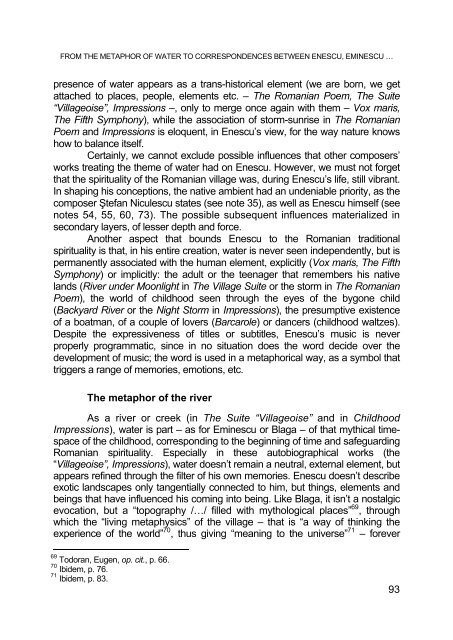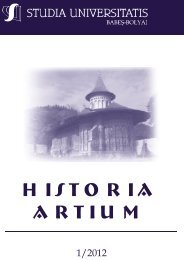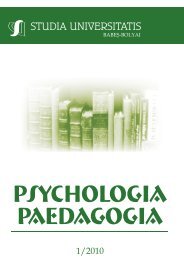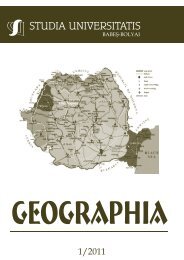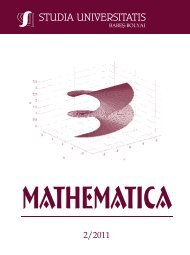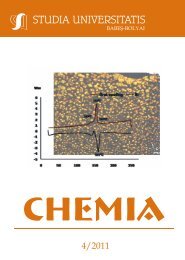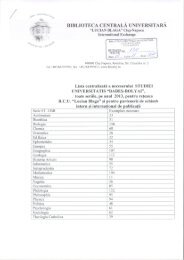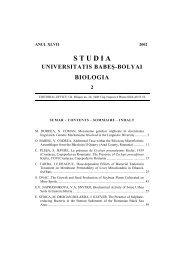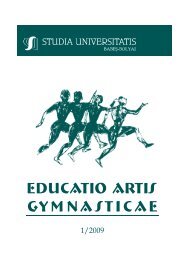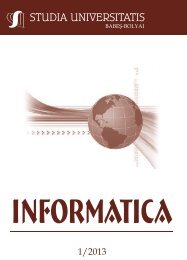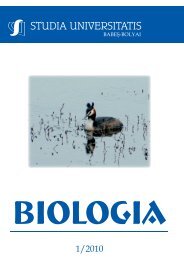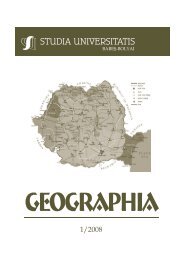musica - Studia
musica - Studia
musica - Studia
Create successful ePaper yourself
Turn your PDF publications into a flip-book with our unique Google optimized e-Paper software.
FROM THE METAPHOR OF WATER TO CORRESPONDENCES BETWEEN ENESCU, EMINESCU …<br />
presence of water appears as a trans-historical element (we are born, we get<br />
attached to places, people, elements etc. – The Romanian Poem, The Suite<br />
“Villageoise”, Impressions –, only to merge once again with them – Vox maris,<br />
The Fifth Symphony), while the association of storm-sunrise in The Romanian<br />
Poem and Impressions is eloquent, in Enescu’s view, for the way nature knows<br />
how to balance itself.<br />
Certainly, we cannot exclude possible influences that other composers’<br />
works treating the theme of water had on Enescu. However, we must not forget<br />
that the spirituality of the Romanian village was, during Enescu’s life, still vibrant.<br />
In shaping his conceptions, the native ambient had an undeniable priority, as the<br />
composer Ştefan Niculescu states (see note 35), as well as Enescu himself (see<br />
notes 54, 55, 60, 73). The possible subsequent influences materialized in<br />
secondary layers, of lesser depth and force.<br />
Another aspect that bounds Enescu to the Romanian traditional<br />
spirituality is that, in his entire creation, water is never seen independently, but is<br />
permanently associated with the human element, explicitly (Vox maris, The Fifth<br />
Symphony) or implicitly: the adult or the teenager that remembers his native<br />
lands (River under Moonlight in The Village Suite or the storm in The Romanian<br />
Poem), the world of childhood seen through the eyes of the bygone child<br />
(Backyard River or the Night Storm in Impressions), the presumptive existence<br />
of a boatman, of a couple of lovers (Barcarole) or dancers (childhood waltzes).<br />
Despite the expressiveness of titles or subtitles, Enescu’s music is never<br />
properly programmatic, since in no situation does the word decide over the<br />
development of music; the word is used in a metaphorical way, as a symbol that<br />
triggers a range of memories, emotions, etc.<br />
The metaphor of the river<br />
As a river or creek (in The Suite “Villageoise” and in Childhood<br />
Impressions), water is part – as for Eminescu or Blaga – of that mythical timespace<br />
of the childhood, corresponding to the beginning of time and safeguarding<br />
Romanian spirituality. Especially in these autobiographical works (the<br />
“Villageoise”, Impressions), water doesn’t remain a neutral, external element, but<br />
appears refined through the filter of his own memories. Enescu doesn’t describe<br />
exotic landscapes only tangentially connected to him, but things, elements and<br />
beings that have influenced his coming into being. Like Blaga, it isn’t a nostalgic<br />
evocation, but a “topography /…/ filled with mythological places” 69 , through<br />
which the “living metaphysics” of the village – that is “a way of thinking the<br />
experience of the world” 70 , thus giving “meaning to the universe” 71 – forever<br />
69 Todoran, Eugen, op. cit., p. 66.<br />
70 Ibidem, p. 76.<br />
71 Ibidem, p. 83.<br />
93


